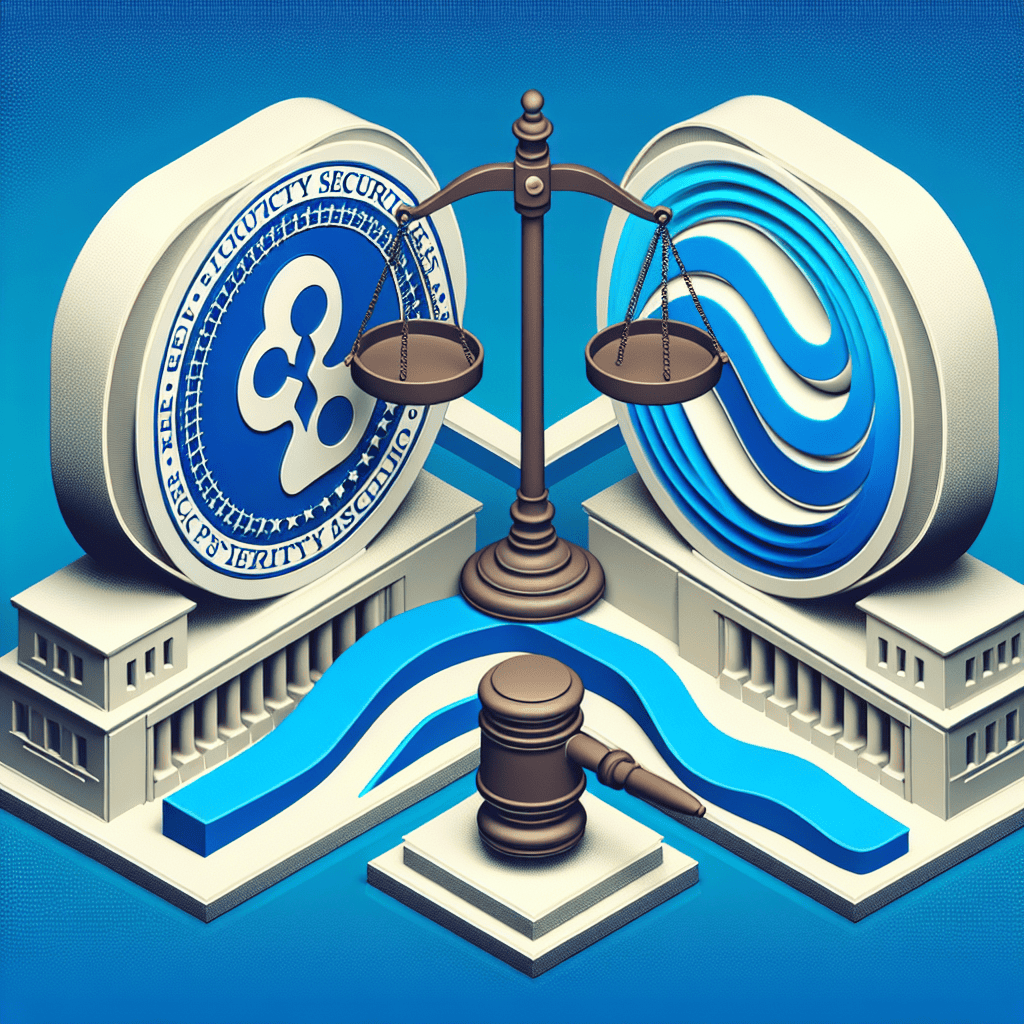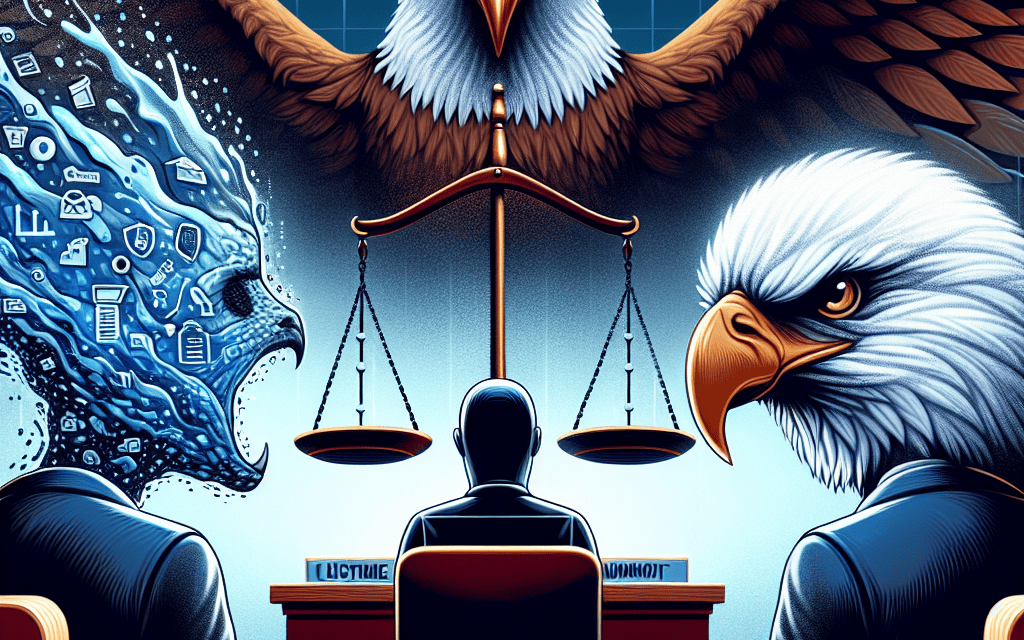“Ripple’s Next Wave: Navigating the Legal Tides in the SEC Showdown.”
Introduction
The ongoing legal battle between the U.S. Securities and Exchange Commission (SEC) and Ripple Labs has captured significant attention within the cryptocurrency industry and beyond. As the case progresses, stakeholders are keenly observing the potential implications for the regulatory landscape surrounding digital assets. The lawsuit, which centers on whether Ripple’s XRP token should be classified as a security, has already set important precedents and could further influence how cryptocurrencies are regulated in the United States. With recent developments in the case, including court rulings and settlement discussions, the next phase of SEC v. Ripple is poised to address critical questions about regulatory clarity, the future of XRP, and the broader impact on the crypto market. As both parties prepare for the next steps, the outcome could have far-reaching consequences for blockchain innovation and investor protection.
Legal Implications of the SEC v. Ripple Outcome
The legal battle between the U.S. Securities and Exchange Commission (SEC) and Ripple Labs has captured the attention of the cryptocurrency world, as its outcome could have far-reaching implications for the regulatory landscape of digital assets. As the case progresses, stakeholders are keenly observing the potential legal precedents that may emerge, which could influence how cryptocurrencies are classified and regulated in the future. The crux of the SEC’s argument is that Ripple’s sale of XRP constitutes an unregistered securities offering, a claim that Ripple vehemently denies. Ripple contends that XRP should be classified as a digital currency, similar to Bitcoin and Ethereum, which the SEC has previously stated are not securities. This fundamental disagreement highlights the broader issue of regulatory clarity in the cryptocurrency space, a concern that has been echoed by industry participants and legal experts alike.
As the case unfolds, one of the primary legal implications revolves around the definition of what constitutes a security. The outcome of this case could set a precedent for how digital assets are evaluated under the Howey Test, a legal standard used to determine whether a transaction qualifies as an investment contract. If the court sides with the SEC, it could lead to increased scrutiny and regulatory oversight for other cryptocurrencies, potentially stifling innovation and growth within the industry. Conversely, a ruling in favor of Ripple could embolden other cryptocurrency projects to challenge the SEC’s authority, potentially leading to a more fragmented regulatory environment.
Moreover, the case could have significant implications for the future of initial coin offerings (ICOs) and other fundraising mechanisms within the cryptocurrency space. A decision that classifies XRP as a security might compel other projects to reassess their compliance with securities laws, potentially leading to a wave of enforcement actions and legal challenges. This could, in turn, prompt lawmakers to revisit existing regulations and consider new legislative frameworks that better accommodate the unique characteristics of digital assets.
In addition to the immediate legal ramifications, the SEC v. Ripple case also underscores the need for greater regulatory clarity and consistency. The lack of clear guidelines has long been a point of contention for industry participants, who argue that the current regulatory environment is both unpredictable and stifling. A resolution to this case could serve as a catalyst for more comprehensive regulatory reform, encouraging lawmakers and regulators to collaborate on creating a more coherent and supportive framework for the cryptocurrency industry.
Furthermore, the outcome of this case could influence international regulatory approaches to digital assets. As countries around the world grapple with how to regulate cryptocurrencies, the legal precedents set by this case could serve as a reference point for other jurisdictions. This could lead to a more harmonized global regulatory landscape, which would benefit both industry participants and consumers by providing greater certainty and protection.
In conclusion, the SEC v. Ripple case is poised to have significant legal implications for the cryptocurrency industry. As the court deliberates on the classification of XRP and the broader regulatory issues at play, the outcome could shape the future of digital asset regulation in the United States and beyond. Whether it leads to increased regulatory scrutiny or paves the way for more innovation-friendly policies, the resolution of this case will undoubtedly have a lasting impact on the legal landscape of cryptocurrencies.
Potential Impact on Cryptocurrency Regulations
The ongoing legal battle between the U.S. Securities and Exchange Commission (SEC) and Ripple Labs has captured the attention of the cryptocurrency world, as its outcome could significantly influence the regulatory landscape for digital assets. As the case progresses, stakeholders are keenly observing the potential ramifications on cryptocurrency regulations, which could extend beyond Ripple and affect the broader industry. The SEC’s lawsuit against Ripple, filed in December 2020, alleges that the company conducted an unregistered securities offering by selling XRP, its native cryptocurrency. Ripple, on the other hand, contends that XRP should be classified as a digital currency, not a security, and thus falls outside the SEC’s jurisdiction. This fundamental disagreement has sparked a broader debate about how cryptocurrencies should be classified and regulated.
The implications of this case are profound, as a ruling in favor of the SEC could set a precedent for how other cryptocurrencies are treated under U.S. securities laws. Such a decision might lead to increased regulatory scrutiny for other digital assets, potentially stifling innovation and growth within the industry. Conversely, a ruling in favor of Ripple could bolster the argument that cryptocurrencies should be regulated differently from traditional securities, potentially paving the way for more tailored regulatory frameworks that accommodate the unique characteristics of digital assets. As the case unfolds, it is essential to consider the broader context of cryptocurrency regulation in the United States. The SEC has been actively working to establish clearer guidelines for digital assets, but the lack of comprehensive legislation has led to uncertainty and confusion among market participants. This regulatory ambiguity has prompted calls for more definitive rules that provide clarity and foster innovation while ensuring investor protection.
In this regard, the outcome of SEC v. Ripple could serve as a catalyst for legislative action. Lawmakers may feel compelled to address the regulatory gaps highlighted by the case, potentially leading to the development of new laws that specifically address the classification and regulation of cryptocurrencies. Such legislation could provide much-needed clarity for the industry, enabling companies to operate with greater confidence and encouraging further investment in the sector. Moreover, the case has underscored the importance of international cooperation in regulating cryptocurrencies. As digital assets are inherently global in nature, a fragmented regulatory approach could lead to regulatory arbitrage, where companies choose to operate in jurisdictions with more favorable regulations. This could undermine efforts to ensure a level playing field and protect investors. Therefore, the outcome of SEC v. Ripple may also influence international regulatory discussions, as countries seek to harmonize their approaches to digital asset regulation.
In conclusion, the SEC v. Ripple case represents a pivotal moment for cryptocurrency regulations, with the potential to shape the future of the industry. As the legal proceedings continue, the outcome could have far-reaching implications, influencing not only how cryptocurrencies are classified and regulated in the United States but also prompting legislative action and international cooperation. The case serves as a reminder of the need for clear and consistent regulatory frameworks that balance innovation with investor protection, ensuring that the cryptocurrency industry can continue to thrive while safeguarding the interests of all stakeholders. As such, the world watches with bated breath, awaiting a resolution that could redefine the regulatory landscape for digital assets.
Ripple’s Strategic Moves Post-SEC Case
In the wake of the high-profile legal battle between Ripple Labs and the U.S. Securities and Exchange Commission (SEC), the cryptocurrency community is keenly observing Ripple’s strategic maneuvers as it navigates the post-case landscape. The lawsuit, which centered on whether Ripple’s XRP token should be classified as a security, has had significant implications for the company and the broader crypto industry. As the dust begins to settle, Ripple is poised to make calculated moves to strengthen its position and capitalize on the evolving regulatory environment.
One of Ripple’s primary strategies involves reinforcing its compliance framework to align with regulatory expectations. The company has been proactive in engaging with regulators and policymakers to foster a clearer understanding of its operations and the nature of XRP. By doing so, Ripple aims to mitigate future legal challenges and establish itself as a compliant and transparent entity within the financial technology sector. This approach not only helps in rebuilding trust with stakeholders but also positions Ripple as a leader in advocating for sensible crypto regulations.
In addition to regulatory compliance, Ripple is focusing on expanding its global footprint. The company has been actively pursuing partnerships and collaborations with financial institutions worldwide to enhance the adoption of its payment solutions. By leveraging its blockchain technology, Ripple seeks to offer faster, more cost-effective cross-border payment services, thereby addressing a critical pain point in the traditional financial system. This strategic expansion is not only aimed at increasing market share but also at demonstrating the practical utility of XRP beyond speculative trading.
Moreover, Ripple is investing in technological innovation to stay ahead in the competitive crypto landscape. The company is channeling resources into research and development to enhance the capabilities of its blockchain platform. By improving scalability, security, and interoperability, Ripple aims to attract a broader range of users and developers to its ecosystem. This focus on innovation is crucial for maintaining a competitive edge and ensuring that Ripple’s solutions remain relevant in a rapidly evolving market.
Furthermore, Ripple is actively engaging with its community and stakeholders to rebuild confidence and support. The company recognizes the importance of maintaining strong relationships with its user base, investors, and partners. Through transparent communication and community initiatives, Ripple is working to restore its reputation and reinforce its commitment to its mission of transforming global payments. This engagement is vital for fostering a loyal and supportive community that can advocate for Ripple’s vision and contribute to its long-term success.
As Ripple charts its course post-SEC case, it is also exploring new business opportunities that align with its core competencies. The company is evaluating potential ventures in decentralized finance (DeFi) and non-fungible tokens (NFTs), areas that have seen significant growth and interest. By diversifying its offerings, Ripple aims to tap into emerging markets and create additional revenue streams. This strategic diversification not only mitigates risks associated with regulatory uncertainties but also positions Ripple to capitalize on new trends in the digital asset space.
In conclusion, Ripple’s strategic moves following the SEC case reflect a comprehensive approach to navigating the challenges and opportunities in the cryptocurrency industry. By focusing on regulatory compliance, global expansion, technological innovation, community engagement, and business diversification, Ripple is laying the groundwork for a resilient and prosperous future. As the company continues to adapt to the dynamic landscape, its actions will undoubtedly influence the broader discourse on cryptocurrency regulation and adoption.
Market Reactions to the SEC v. Ripple Verdict

The recent verdict in the SEC v. Ripple case has sent ripples through the cryptocurrency market, prompting a range of reactions from investors, analysts, and industry stakeholders. As the dust begins to settle, market participants are keenly assessing the implications of the court’s decision and what it might mean for the future of digital assets. The ruling, which partially favored Ripple by determining that its XRP token is not a security when sold on exchanges, has been hailed as a significant victory for the company and the broader crypto industry. However, the court also found that Ripple’s direct sales of XRP to institutional investors did constitute securities transactions, adding a layer of complexity to the outcome.
In the immediate aftermath of the verdict, XRP experienced a notable surge in value, reflecting investor optimism about the token’s regulatory status. This price movement underscores the market’s sensitivity to legal developments and the potential for regulatory clarity to drive asset valuations. The decision has also sparked a broader rally in the cryptocurrency market, as traders speculate that the ruling could set a precedent for other digital assets facing similar scrutiny. Nevertheless, the mixed nature of the verdict has left some uncertainty in the air, prompting questions about how the SEC might approach future enforcement actions and whether other cryptocurrencies might be subject to similar legal challenges.
As market participants digest the implications of the ruling, attention is turning to the potential for legislative and regulatory changes that could provide clearer guidelines for the classification and treatment of digital assets. The case has highlighted the need for a more nuanced regulatory framework that can accommodate the unique characteristics of cryptocurrencies while ensuring investor protection and market integrity. In this context, the verdict may serve as a catalyst for renewed discussions among policymakers, regulators, and industry leaders about how best to achieve this balance.
Moreover, the outcome of the SEC v. Ripple case is likely to influence the strategies of other cryptocurrency companies as they navigate the evolving regulatory landscape. Companies may become more cautious in their token offerings and seek to engage more proactively with regulators to mitigate the risk of enforcement actions. This shift could lead to increased collaboration between the crypto industry and regulatory bodies, fostering a more constructive dialogue about the future of digital finance.
In addition to its impact on market dynamics and regulatory discourse, the verdict has also sparked a broader conversation about the role of innovation in the financial sector. Proponents of blockchain technology argue that the ruling underscores the need to support technological advancement while ensuring that regulatory frameworks are adaptable to new developments. This perspective emphasizes the importance of fostering an environment that encourages innovation while maintaining robust oversight to protect consumers and maintain market stability.
As the market continues to react to the SEC v. Ripple verdict, it is clear that the decision marks a pivotal moment in the ongoing evolution of the cryptocurrency industry. While the ruling provides some clarity, it also raises new questions about the future regulatory landscape and the role of digital assets in the global financial system. As stakeholders navigate these complexities, the case serves as a reminder of the dynamic and rapidly changing nature of the crypto market, highlighting the need for vigilance, adaptability, and collaboration in shaping its future trajectory.
Future of XRP in the Financial Ecosystem
The ongoing legal battle between the U.S. Securities and Exchange Commission (SEC) and Ripple Labs has captured the attention of the financial world, as its outcome could significantly influence the future of digital assets, particularly XRP, within the financial ecosystem. As the case progresses, stakeholders are keenly observing the potential implications for XRP and the broader cryptocurrency market. The SEC’s lawsuit, filed in December 2020, alleges that Ripple conducted an unregistered securities offering by selling XRP. Ripple, on the other hand, contends that XRP should be classified as a digital currency, not a security, and thus falls outside the SEC’s jurisdiction. This legal distinction is crucial, as it will determine the regulatory framework under which XRP operates.
As the case unfolds, one possible outcome is that the court sides with the SEC, classifying XRP as a security. Such a decision would necessitate compliance with stringent regulatory requirements, potentially stifling innovation and limiting XRP’s utility in the financial ecosystem. This could lead to a decrease in its adoption by financial institutions and payment providers, who may seek alternative digital assets with clearer regulatory status. Moreover, a ruling in favor of the SEC could set a precedent for other cryptocurrencies, prompting increased regulatory scrutiny across the industry.
Conversely, if the court rules in favor of Ripple, XRP could emerge with a strengthened position in the financial ecosystem. A favorable outcome for Ripple would likely bolster confidence among investors and financial institutions, encouraging further adoption and integration of XRP into payment systems and cross-border transactions. This could enhance XRP’s role as a bridge currency, facilitating faster and more cost-effective international money transfers. Additionally, a Ripple victory could provide clarity for other digital assets, potentially fostering a more innovation-friendly regulatory environment.
Regardless of the outcome, the case has already sparked a broader conversation about the need for clear and consistent regulatory guidelines for digital assets. The lack of regulatory clarity has been a longstanding challenge for the cryptocurrency industry, often hindering its growth and integration into traditional financial systems. As such, the SEC v. Ripple case underscores the importance of establishing a comprehensive regulatory framework that balances investor protection with the promotion of innovation.
In anticipation of the court’s decision, Ripple has continued to expand its partnerships and use cases for XRP. The company has been actively working with financial institutions and payment providers worldwide to demonstrate the utility of its technology. This proactive approach aims to solidify XRP’s position in the financial ecosystem, regardless of the legal outcome. Furthermore, Ripple’s efforts to engage with regulators and policymakers highlight the importance of collaboration in shaping the future of digital assets.
In conclusion, the future of XRP in the financial ecosystem hinges on the outcome of the SEC v. Ripple case. While the legal battle presents significant challenges, it also offers an opportunity to address the regulatory uncertainties that have long plagued the cryptocurrency industry. As the case progresses, its implications will likely extend beyond XRP, influencing the regulatory landscape for digital assets as a whole. Consequently, stakeholders across the financial ecosystem are closely monitoring the developments, recognizing that the resolution of this case could pave the way for a more defined and supportive environment for digital innovation.
Lessons Learned from the SEC v. Ripple Case
The SEC v. Ripple case has been a landmark legal battle in the cryptocurrency world, offering numerous lessons for stakeholders in the digital asset space. As the case unfolds, it provides a unique lens through which to examine the evolving regulatory landscape and the implications for both established and emerging players in the industry. One of the primary lessons from this case is the importance of regulatory clarity. The SEC’s lawsuit against Ripple Labs, alleging that the company conducted an unregistered securities offering through its sale of XRP tokens, underscores the need for clear guidelines on what constitutes a security in the context of digital assets. This lack of clarity has been a persistent issue, creating uncertainty for companies seeking to innovate within the blockchain and cryptocurrency sectors. Consequently, the case highlights the urgent need for regulatory bodies to establish more precise definitions and frameworks to guide industry participants.
Moreover, the Ripple case has emphasized the significance of compliance and due diligence for cryptocurrency companies. As regulatory scrutiny intensifies, companies must ensure that their operations align with existing laws and regulations. This involves not only understanding the legal classification of their tokens but also implementing robust compliance measures to mitigate potential legal risks. The case serves as a cautionary tale, reminding companies of the potential consequences of non-compliance, which can include costly legal battles, reputational damage, and financial penalties. In addition to compliance, the case has also shed light on the role of transparency and communication with regulators. Ripple’s defense has centered around claims that the SEC failed to provide fair notice that its actions were in violation of securities laws. This aspect of the case underscores the importance of open dialogue between companies and regulatory bodies. By fostering transparent communication, companies can better understand regulatory expectations and work collaboratively with authorities to address potential concerns before they escalate into legal disputes.
Furthermore, the SEC v. Ripple case has broader implications for the cryptocurrency market as a whole. The outcome of this case could set a precedent for how other digital assets are classified and regulated in the future. A ruling in favor of the SEC could lead to increased regulatory oversight and potentially stifle innovation by imposing stringent requirements on cryptocurrency projects. Conversely, a decision favoring Ripple could embolden other companies to challenge regulatory actions and advocate for more favorable treatment of digital assets. This potential for precedent-setting outcomes makes the case a focal point for industry observers and participants alike. As the case progresses, it also highlights the dynamic nature of the regulatory environment surrounding cryptocurrencies. The rapid pace of technological advancements in the blockchain space often outstrips the ability of regulatory frameworks to keep up. This creates a challenging landscape for both regulators and industry participants, who must navigate a complex web of legal, technological, and market considerations. The Ripple case serves as a reminder of the need for adaptive regulatory approaches that can accommodate the unique characteristics of digital assets while ensuring investor protection and market integrity.
In conclusion, the SEC v. Ripple case offers valuable insights into the challenges and opportunities facing the cryptocurrency industry. It underscores the need for regulatory clarity, compliance, transparency, and adaptive approaches to regulation. As the case continues to unfold, it will undoubtedly shape the future of digital asset regulation and influence the strategies of companies operating within this rapidly evolving sector. The lessons learned from this case will be instrumental in guiding the development of a more robust and sustainable cryptocurrency ecosystem.
Predictions for Upcoming SEC Cryptocurrency Cases
The ongoing legal battle between the U.S. Securities and Exchange Commission (SEC) and Ripple Labs has captured the attention of the cryptocurrency world, serving as a pivotal case that could shape the future regulatory landscape for digital assets. As the case progresses, it is crucial to consider the potential implications and outcomes that may influence upcoming SEC cryptocurrency cases. The Ripple case, centered around the classification of XRP as a security, has set a precedent for how the SEC might approach similar cases in the future. The court’s decision will likely provide a framework for determining whether other cryptocurrencies fall under the same regulatory scrutiny. This could lead to a more defined set of guidelines for cryptocurrency projects, offering clarity on compliance requirements and reducing the ambiguity that currently surrounds the industry.
In anticipation of the court’s ruling, it is essential to examine the broader context of the SEC’s regulatory approach. The SEC has consistently emphasized its commitment to protecting investors and maintaining fair, orderly, and efficient markets. This mission suggests that the agency will continue to scrutinize cryptocurrency projects that potentially mislead investors or operate outside established legal frameworks. Consequently, the outcome of the Ripple case could embolden the SEC to pursue further actions against other digital asset companies that it perceives as non-compliant. Moreover, the Ripple case has highlighted the need for a more comprehensive regulatory framework for cryptocurrencies. The current patchwork of regulations has led to uncertainty and inconsistency, prompting calls for clearer guidelines. In response, lawmakers and regulators may push for new legislation that addresses the unique challenges posed by digital assets. Such legislation could provide a more cohesive approach to cryptocurrency regulation, balancing innovation with investor protection.
As the SEC continues to navigate the complexities of cryptocurrency regulation, it is likely to focus on areas such as initial coin offerings (ICOs), decentralized finance (DeFi), and non-fungible tokens (NFTs). These sectors have experienced significant growth and innovation, but they also present unique regulatory challenges. The SEC may seek to establish clearer rules for these areas, ensuring that they operate within the bounds of existing securities laws. Additionally, the Ripple case underscores the importance of international cooperation in regulating cryptocurrencies. Digital assets operate in a global context, and regulatory actions in one jurisdiction can have far-reaching implications. As such, the SEC may collaborate with international counterparts to develop harmonized regulatory standards that address cross-border issues and promote global market stability.
In conclusion, the SEC v. Ripple case is poised to have a lasting impact on the regulatory landscape for cryptocurrencies. The outcome will likely influence how the SEC approaches future cases, potentially leading to more defined guidelines and increased enforcement actions. As the cryptocurrency industry continues to evolve, it is imperative for regulators, lawmakers, and industry participants to work together to create a balanced regulatory framework that fosters innovation while protecting investors. By doing so, they can ensure that the cryptocurrency market remains a dynamic and integral part of the global financial system.
Q&A
1. **What is the current status of the SEC v. Ripple case?**
– The case is ongoing, with both parties having filed various motions and responses. A summary judgment decision is anticipated, but the timeline remains uncertain.
2. **What are the key legal issues in the SEC v. Ripple case?**
– The primary issue is whether Ripple’s sale of XRP constitutes an unregistered securities offering under U.S. securities laws.
3. **What could be the potential outcomes of the case?**
– Possible outcomes include a ruling in favor of the SEC, a ruling in favor of Ripple, a settlement between the parties, or a partial ruling that addresses specific aspects of the case.
4. **How might a ruling in favor of the SEC impact Ripple?**
– A ruling in favor of the SEC could result in penalties for Ripple, restrictions on XRP sales, and potential implications for the broader cryptocurrency market.
5. **How might a ruling in favor of Ripple impact the cryptocurrency industry?**
– A ruling in favor of Ripple could provide clarity on the regulatory status of cryptocurrencies and potentially limit the SEC’s ability to classify similar digital assets as securities.
6. **What are the implications of a settlement in the SEC v. Ripple case?**
– A settlement could involve Ripple agreeing to certain conditions or penalties without admitting wrongdoing, potentially allowing XRP to continue trading with some regulatory clarity.
7. **What are the next steps in the legal process for the SEC v. Ripple case?**
– The next steps include awaiting the court’s decision on summary judgment motions, which could lead to a trial if not resolved, or further negotiations for a potential settlement.
Conclusion
In the ongoing SEC v. Ripple case, the next steps likely involve further legal proceedings, including potential appeals by either party following the court’s rulings on summary judgment motions. The case may also move towards a trial if unresolved issues remain. Additionally, both parties might engage in settlement discussions to avoid prolonged litigation. The outcome of this case could have significant implications for the regulatory landscape of cryptocurrencies in the United States, potentially influencing how digital assets are classified and regulated in the future.





